What to Eat If…You Can't Poop
Backed up? Feeling bloated? Get some relief by switching up your diet.

If you've ever struggled to use the bathroom, you're not alone.
Constipation is an all-too-common gastrointestinal problem characterized by fewer than three bowel movements a week. Chronic constipation, infrequent bowel movements or difficulty passing stool that lasts for several weeks, affects about 63 million Americans. In some cases, both chronic and acute constipation can be treated with medication to soften stool.
Some diet tweaks can also help move things along. Certain foods, especially those high in fiber and water, can help alleviate constipation.
We spoke with Robin Foroutan, RDN, a spokesperson for the Academy of Nutrition and Dietetics in New York, New York, about the reasons you might be constipated plus which foods can help you go to the bathroom.
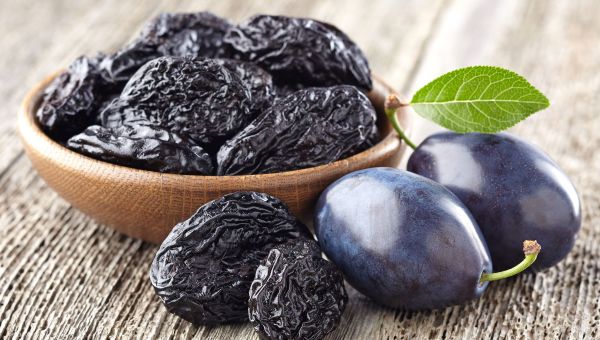
Prunes
Prunes, known for their deep and shriveled skin, are actually a dried version of the plum. Per half-cup serving, prunes contain about 6 grams of dietary fiber—which our bodies rely on for healthy bowel movements. To put that in perspective: The National Academy of Medicine recommends women consume about 25 grams of dietary fiber a day, and men, 38 grams daily.
There are other properties that make prunes exceptional in relieving constipation. Fructose and sorbitol, sugars and sugar alcohols found in the fruit, often produce a laxative-like effect on digestion, making it a bit easier to go.
If you’re feeling constipated, try munching on a small handful or roasting them with sliced carrots and your favorite herbs.
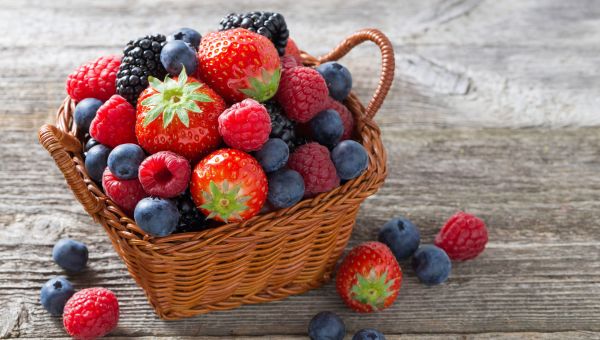
Berries
You'll be pleased to know berries make the list of constipation-relieving foods. A cup of raspberries contains 8 grams of dietary fiber and just 64 calories. That's a digestion-friendly snack you can feel good about eating.
Berries are hydrating, too. Strawberries are made up of about 91 percent H2O. In addition to helping regulate body temperature, lubricating joints and protecting the spinal cord, adequate hydration helps food pass through the intestines, decreasing the risk of constipation.
Berries aren't the only hydrating foods Foroutan recommends. "Things like cucumber and celery have a lot of moisture, but it doesn't replace the 8 to 10 glasses of water a day.”
The amount of water you need varies from person to person, and for most people, the best advice is simply to drink when you’re thirsty. People with certain medical conditions or who take some medications may need to watch their intake, so check with your doctor about the right amount for you. One recommendation from the National Academies of Sciences, Engineering and Medicine suggests men and women should consume between 2 and 4 liters of liquid a day. Get a head start on hydration by adding berries and other water-rich foods to your diet.
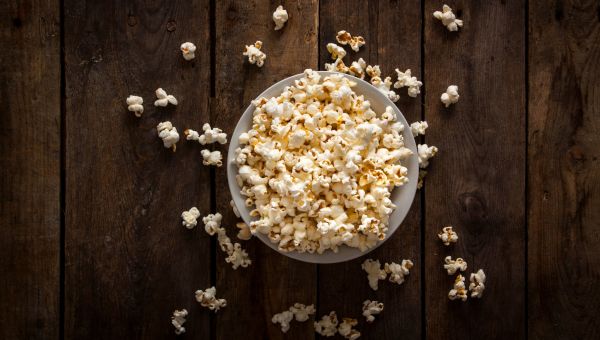
Air-popped popcorn
Certain snack foods, like air-popped popcorn, can help you poop. But before you toss a bag of butter-coated kernels into the microwave, there are some things to keep in mind.
Noshing air-popped popcorn is a low-calorie way to add some fiber to your diet. Per cup, this snack contains just 30 calories and 1 gram of fiber, so don't be afraid to enjoy a handful—or three. Unhealthy additives, like butter, can add extra calories, so it's better to go without.
Like other whole grains, popcorn contains some important nutrients. This snack contains potassium and magnesium, two minerals that help maintain bone and muscle health and regulate fluids in the body.
"Magnesium is really important for muscle conductivity, and if we think of our digestive tract as a big, long muscle that moves, we can understand magnesium is a really important nutrient," Foroutan says.
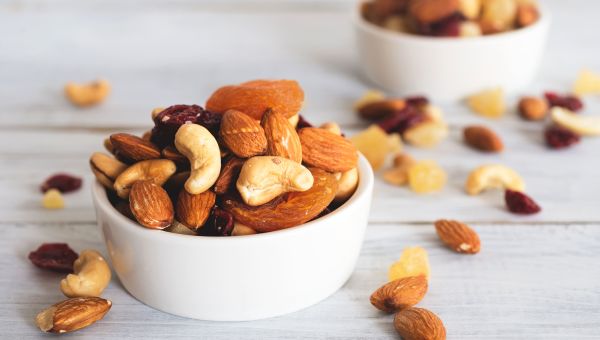
Nuts
Nuts, like walnuts and almonds, contain a dose of healthy fat, protein and fiber. An ounce of walnuts, about 14 halves, contains about 2 grams of fiber. The same serving of almonds, about 23 kernels, contains just over 3 grams.
In addition to lowering cholesterol levels and protecting your heart, "healthy fats can help lubricate the gut," Foroutan says. Although nuts contain loads of healthy properties, they're also dense with calories, so don’t overdo your intake. Per ounce, almonds contain 162 calories, and walnuts, 185 calories. Top your lunchtime salad with a tablespoon of chopped nuts or eat a fistful of crunchy kernels as a snack.
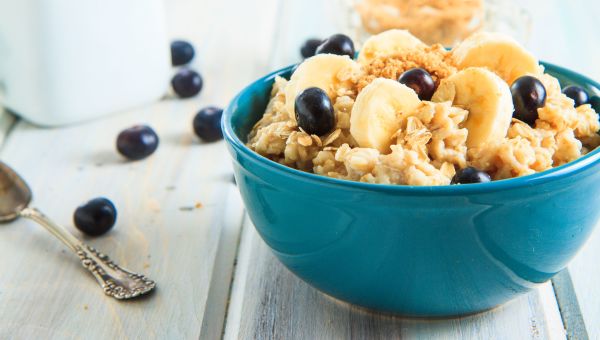
Oatmeal
Oats, another whole grain, are known for their versatility and satiety power. Per dry cup, oats contain 8 grams of fiber, about half of which is soluble. This type of fiber attracts moisture, and helps stool pass more easily. In fact, a 2014 systemic review of thirty eight articles suggests a link between oats and oat bran and a decrease in constipation. A one-cup serving of oats also packs more than 100 percent of the daily recommended amount of manganese, a mineral that helps keep your brain, nerves, blood and bones healthy.
If you're feeling backed up, stir up a warm bowl of oats and top with other digestion-friendly foods, like fresh fruit or chopped nuts.
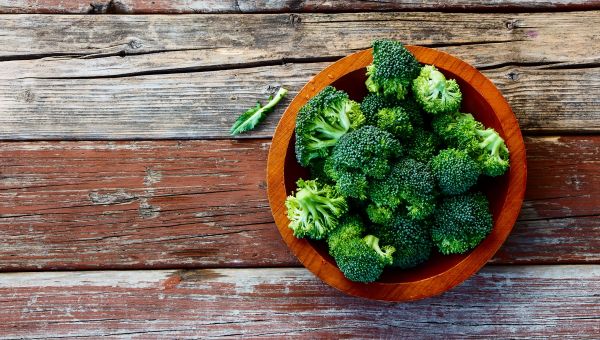
Broccoli
These crunchy florets are helpful in relieving constipation for a number of reasons. One chopped cup contains more than 2 grams of fiber, is made of 90 percent water and contains just 31 calories per cup.
Broccoli also contains an essential nutrient for digestion: magnesium. A cup-sized serving contains 19 milligrams of magnesium. Why is this mineral so important? A diet low in magnesium may result in constipation, so getting enough of the nutrient is important to keeping things moving.
Enjoy a side of steamed or baked broccoli with your evening meal. Or, if you're looking for a healthy snack, try dipping a few florets in a serving of hummus, a chickpea spread with its own benefits. Hummus contains 1 gram of fiber per tablespoon, so it may also helpful for relieving constipation.
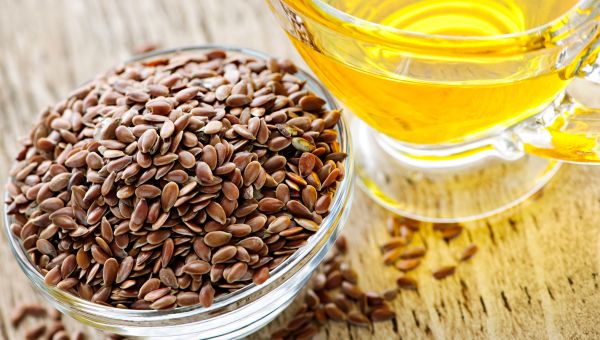
Flaxseed
Flaxseed comes from the flax plant, an herb used in ancient times as both food and medicine. Flaxseed comes in a number of different forms—ground, whole seeds and oil—and is a good source of omega-3 fatty acid, which may help protect the heart from disease.
That's not all. Flaxseed contains a good amount of fiber, 2 grams per ground tablespoon, which helps promote healthy digestion. These seeds also contain mucilage, a gummy substance that, along with fiber, helps add bulk to stool.
These seeds were used as laxatives in decades past. Today, they can help relieve constipation, and they're simple to incorporate into your diet. Sprinkle a spoonful atop your afternoon salad, morning oats or blend in your next smoothie.
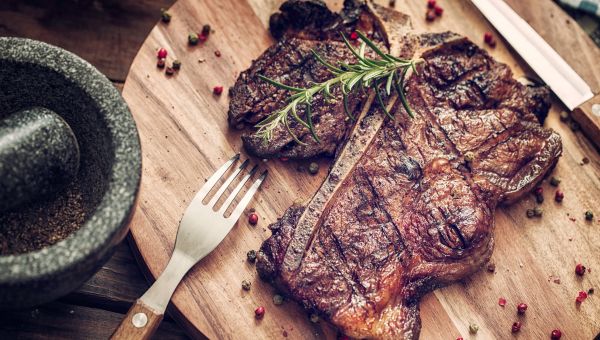
What not to eat
If you want to have regular, healthy bowel movements then avoid low fiber foods like red meats and dairy products. You might also want to steer clear of processed foods like white bread and pastas, French fries, pastries and chips—which may make constipation worse.
Aside from diet, Foroutan says that dehydration, stress and inactivity can also contribute to constipation. An easy way to stress less and move more? Track it! Free apps, like Sharecare, available for iOS and Android, allow you to log your stress—which may help pinpoint your biggest stressors—as well as your physical activity.
A healthy diet full of whole foods—think fruits, veggies and whole grains—is beneficial for digestion and may help with constipation. However, if it's been three or more days since your last bowel movement, you feel bloated, nauseous or have blood in your stool, contact your healthcare provider. Your doctor is best able to prescribe a course of treatment that may include laxatives or a special diet.
More On


video
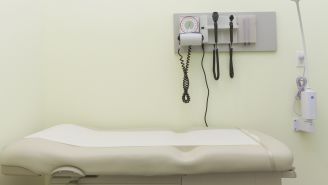
article


video

article
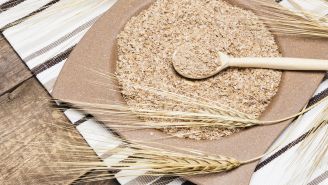
article
